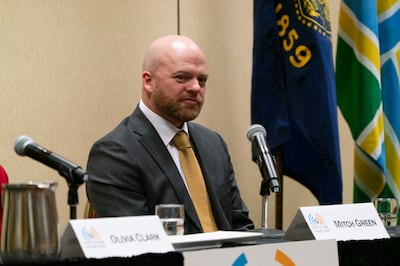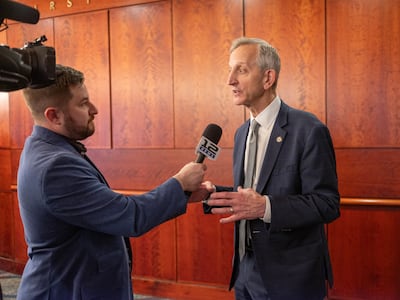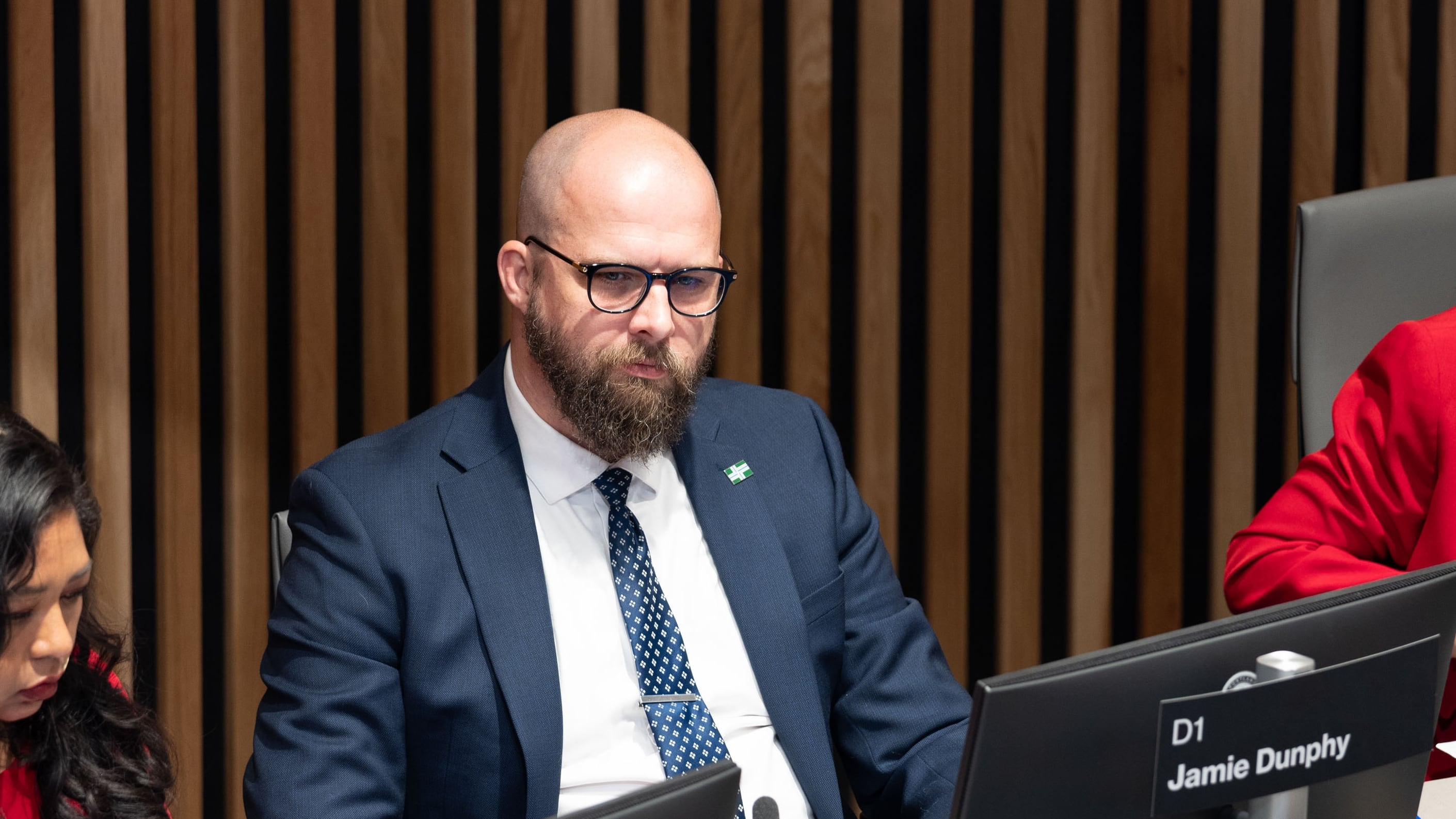Portland Mayor Keith Wilson has exceptional manners. And he expects the same from his bureau directors.
Shea Flaherty Betin, executive director of Prosper Portland, was already on thin ice with the mayor late last month. He’d engaged in a public fight with two city councilors over their proposal to cut all of the city’s economic development agency’s general fund dollars, totaling $11 million. Those councilors, Mitch Green and Jamie Dunphy, had repeatedly raised questions from the dais about Prosper’s accountability, spending and oversight. It was a drumbeat of public questioning that the quasi-independent agency hadn’t been subjected to in years.
Then, early last week, Mayor Wilson’s office received copies of a text message thread among top Prosper Portland staff, including Flaherty Betin. The messages showed Prosper staff exchanging criticisms of council members.

WW has learned that it was those messages, coupled with concerns shared with the mayor by Green and Dunphy about Flaherty Betin’s conduct, that cost the Prosper director his $212,992-a-year job. The mayor requested that Flaherty Betin “step aside,” Wilson’s office said.
In the wake of Flaherty Betin’s departure, Prosper board members have bemoaned the mayor’s decision. But on the first occasion that the city bureaucracy has crossed swords with the newly elected council and mayor, the elected officials demonstrated their power.
And Dunphy isn’t finished. “If voters understood how little oversight and accountability there is over billions of public dollars being handled by Prosper Portland, they would be shocked,” he tells WW. “I believe that for the first time in history this City Council is ready to have that conversation.”
Prosper Portland for decades revitalized beleaguered neighborhoods across the city using a tool called tax-increment financing, more colloquially known as urban renewal districts.
While those projects transformed neighborhoods like the Pearl District and South Waterfront into economic hubs, they also pushed out communities of color who could no longer afford to live there. Nowhere was that more evident than in the Albina neighborhood, where Black families were sent packing in the 1960s and ’70s. (Just last week, the Portland City Council voted to approve an $8.5 million settlement in a suit filed by 26 descendants of some of those Black families against the city of Portland. The settlement explicitly cites the devastating effects of urban renewal.)
Under scrutiny for the gentrification caused by urban renewal projects, historically the agency’s largest source of revenue, Prosper pivoted away from the practice in the mid-aughts. It’s struggled since then to generate revenue, especially as the existing TIF districts sunset.

Late last year, the departing City Council approved the creation of six new TIF districts formed with far more community input than prior districts. Upon their arrival in office, Green and Dunphy expressed their displeasure with that decision—and took a knife to Prosper’s budget, seeking to cut the entire $11 million the agency was slated to receive from the city’s general fund.
Prosper’s leaders fought back hard against the proposal, and they did so publicly.
Flaherty Betin asked supporters in a widely shared email to write letters to city leaders, urging them not to cut Prosper’s budget. He wrote the cut would “represent a reversal of all the progress we’ve made to center racial equity and to balance our urban development TIF work with inclusive economic development partnerships” and would have a “catastrophic effect.”
Such public lobbying by the director of a city bureau or agency is highly unusual, and Dunphy didn’t like it. “No other agency would blast emails to every past permit holder or program attendee and be disingenuous about a proposal facing this body,” Dunphy said at the May 21 marathon budget session, where his proposal to cut Prosper was defeated 8–4.

Wilson, according to people close to the matter, was unhappy with how Prosper handled the cut discussions.
But the final straw for Flaherty Betin, according to three sources familiar with the matter, came when Wilson’s office received copies of the message thread among Prosper staff during, and in the wake of, the City Council’s marathon budget session on May 21.
Copies of the messages obtained by WW show that Flaherty Betin took part in the message exchange with his subordinates.
The messages, reported last week on wweek.com , included sarcastic jabs aimed at Dunphy, Green and the council at large.
At no point in the messages WW reviewed did Flaherty Betin direct staffers to button up and keep their thoughts on the new city leadership to themselves—or at least not put those thoughts in writing. Instead, he offered notes of encouragement, saying, among other things, that he was “vibrating from delirium” as the vote on Prosper’s funding approached.
Councilors Green and Dunphy received copies of the messages and shared concerns with the mayor’s office about their contents in the following days.
Dunphy, a former longtime city staffer, says the messages displayed a “level of dishonesty and unprofessional behavior that would never have been tolerated [from] any other public employee in the city government.”
Mayoral spokesman Cody Bowman says the message thread “contributed” to the mayor’s decision to ask Flaherty Betin to step down from his position, but did not expand further.
Dunphy says he was particularly concerned by two photos shared by a top Prosper manager on May 23, two days after the council voted against cutting Prosper’s budget. WW received copies of those photos and the messages accompanying them.
A Prosper manager sent two photos to the Prosper chat on May 23. The two pictures depicted three men holding liquor bottles and boxes of pastries.
“Thanked a few of the folks who stood up for us over the last week,” Mitch Daugherty, manager of Prosper’s Office of Small Business, wrote in a caption on the photos. “Hope you all have a wonderful weekend.”
The notion rewarding the agency’s supporters for coming to the defense of Prosper’s funding first emerged in the all-staff Prosper message thread on May 21.
Interim director of economic development Andrew Fitzpatrick wrote in the thread: “We are doing special appreciation care packages for some selected champions—need to be on a thank you tour going forward!”
The men pictured are known community figures. Social media records show that all three had lobbied in support of Prosper on social media accounts in the week before the May 21 budget discussion, including on LinkedIn and Instagram.
There’s no indication the gifts violated any city or state rules. Prosper spokesman Shawn Uhlman says Daugherty paid for the liquor with his own money; Uhlman adds no agency money was used to purchase the gifts.
“I won’t spite the Prosper Portland team for using colorful language in this thread, but it does seem to imply that certain community leaders were compensated for their advocacy efforts with rewards of hard alcohol,” Councilor Dunphy said in a statement to WW. “If that’s the case, that would be extremely concerning.”
Wilson was made aware of the photos but had not seen physical copies of them prior to making his decision, Bowman says.
Councilor Green says he raised concerns with Aisling Coghlan, Wilson’s chief of staff, “about the message screenshots…both in the context of whether it constitutes inappropriate lobbying or violates ethics rules vis-à-vis the alcohol gifts.”
Uhlman in a statement said that Daugherty “was out Friday evening with close friends and professional colleagues who he has known and worked with for more than 15 years. Anything he purchased was with his own money and on his own time.”
Any public support for Prosper’s budget voiced by the three men pictured, Uhlman says, was made “of their own volition.”

